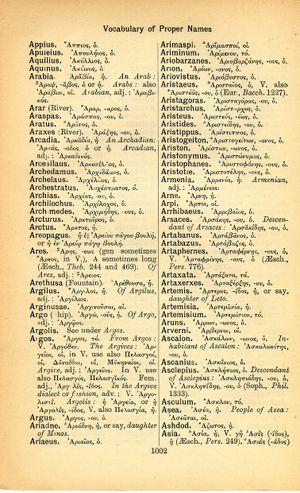Aristippus: Difference between revisions
τὸ ἀγαθὸν αἱρετόν· τὸ δ' αἱρετὸν ἀρεστόν· τὸ δ' ἀρεστὸν ἐπαινετόν· τὸ δ' ἐπαινετὸν καλόν → what is good is chosen, what is chosen is approved, what is approved is admired, what is admired is beautiful
(Gf-D_1) |
(3_2) |
||
| Line 8: | Line 8: | ||
{{Gaffiot | {{Gaffiot | ||
|gf=<b>Ăristippus</b>,¹³ ī, m. (Ἀρίστιππος), Aristippe [[philosophe]] de Cyrène] : Cic. Fin. 2, 18 ; Hor. Ep. 1, 1, 18 || <b>-pēus</b>, a, um, d’Aristippe : Cic. Fin. 2, 20.||<b>-pēus</b>, a, um, d’Aristippe : Cic. Fin. 2, 20. | |gf=<b>Ăristippus</b>,¹³ ī, m. (Ἀρίστιππος), Aristippe [[philosophe]] de Cyrène] : Cic. Fin. 2, 18 ; Hor. Ep. 1, 1, 18 || <b>-pēus</b>, a, um, d’Aristippe : Cic. Fin. 2, 20.||<b>-pēus</b>, a, um, d’Aristippe : Cic. Fin. 2, 20. | ||
}} | |||
{{Georges | |||
|georg=Aristippus, ī, m. (Ἀρίστιππος), [[ein]] [[Philosoph]] aus Kyrene (um 380 v. Chr.), [[Schüler]] [[des]] Sokrates, [[Stifter]] der kyrenäischen [[Sekte]], Cic. de fin. 2, 18 sqq. Lact. epit. 39, 7; vgl. Schmid Hor. ep. 1, 1, 18. – Dav. Aristippēus, a, um, aristipëisch, [[illud]] Aristippeum contemnere, Cic. de fin. 2, 18. | |||
}} | }} | ||
Revision as of 09:16, 15 August 2017
English > Greek (Woodhouse)
Ἀρίστιππος, ὁ.
Latin > English (Lewis & Short)
Ăristippus: i, m., = Ἀρίστιππος,
I a philosopher of Cyrene, disciple of Socrates, and founder of the Cyrenaic school: qui voluptatem summum bonum dicit, Cic. Fin. 2, 6, 18; Hor. Ep. 1, 1, 18.—Hence, Ari-stippēus, a, um, adj., of or pertaining to Aristippus, Cic. Fin. 2, 6, 18.
Latin > French (Gaffiot 2016)
Ăristippus,¹³ ī, m. (Ἀρίστιππος), Aristippe philosophe de Cyrène] : Cic. Fin. 2, 18 ; Hor. Ep. 1, 1, 18 || -pēus, a, um, d’Aristippe : Cic. Fin. 2, 20.
Latin > German (Georges)
Aristippus, ī, m. (Ἀρίστιππος), ein Philosoph aus Kyrene (um 380 v. Chr.), Schüler des Sokrates, Stifter der kyrenäischen Sekte, Cic. de fin. 2, 18 sqq. Lact. epit. 39, 7; vgl. Schmid Hor. ep. 1, 1, 18. – Dav. Aristippēus, a, um, aristipëisch, illud Aristippeum contemnere, Cic. de fin. 2, 18.

